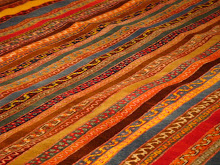An article in the May/June 2010 International Educator publication presents an interview with John Zogby suggesting that the students of today - and more specifically, those born between 1979 and 1991 - are First Globals. Below are some excerpts from the article.
IE: What is a First Global? (p.23)
Zogby: I use the name interchangeably with 18-30-year-olds not because everyone in this age group fits the description but because those with passports, global social networks, and a planetary sensibility dominate the whole cohort...I define them by their sense that the world is their playing field...It was the first time I ever used the phrase that suggested that this group is not defined by facts they know but by their awareness: "They may not be able to immediately find Darfur on the map, but what sets them apart among earlier cohorts of twenty-somethings is that they know there is a Darfur on the map..."
IE: You have defined today's young people as "First Globals." What traits do First Globals have that other generations did not? (p.22)
Zogby: It is the name I give to those Americans born between 1979 and 1999. Over half have traveled abroad, are the age cohort most likely of any to consider themselves "citizens of the planet Earth," are least likely to feel that American culture is inherently superior to the cultures of other peoples, tell us that America will most likely "look like Barak Obama 20 years from now because he looks like us," are most likely to favor the United States cooperating with international agencies and protocols in responding to crises, and are most open-minded to immigration and immigrants. They have been introduced to open borders throughout their lives via MTV, fashion, the Internet, and social networking. Thus, the whole world is their playing field..."
IE: What does it mean for this generation of students to be "global citizens"? (p. 23)
Zogby: They literally have a world full of choices. They are not limited by space or geography. Sometimes the choices can be overwhelming and stifling but being a First Global means redefining who they will respond to their world...Employers will have to get accustomed to new definitions of tenure and longevity. First Globals want to move. Today's twentysomethings will have had four jobs by the age of 30 and ten by the age of 40. So now our focus as employers is not to ensure their loyalty for long-term employment but instead keep them loyal because we need to ensure that they will leave happy. Blogging and tweeting about a bad experience travels now at the speed of light..."
IE: In recent years, education abroad has become more popular among college students. Do you think the outlook that First Globals have about the world has increased interest in studying abroad? Do you think First Globals do or will have more interest in studying abroad differently than students in generations past? (pp. 24-26)
Zogby: One thing that is notable already about First Globals is how much they are changing philanthropy. Crises are less remote to this group and their ability to act by spreading the word (and pictures) virally is as impressive as their contributions to texting..."
For the full article, including more information on Zogby, click here.
Do you agree?
Here are some other thoughts along a similar line of inquiry attempting to understand today's students:
Is this accurate?
How would you describe today's student - today's UNC Charlotte student?
Light rail extension coming to campus in 2017
9 years ago

No comments:
Post a Comment